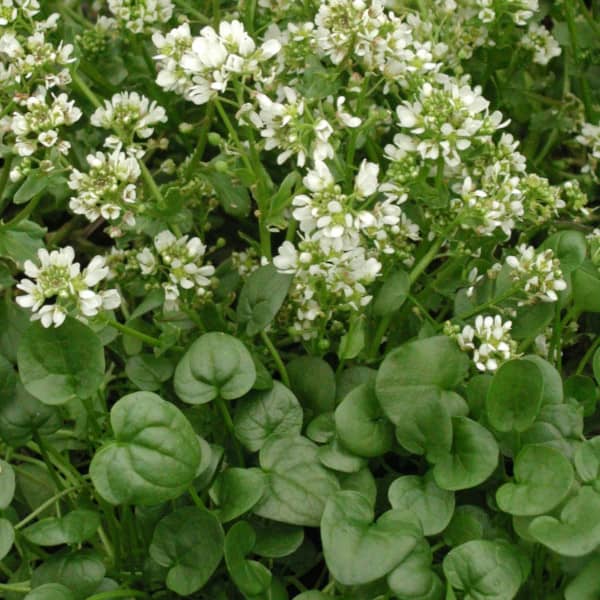Benjis seeds
Scurvy Grass [Cochlearia officinalis]
Scurvy Grass [Cochlearia officinalis]
Couldn't load pickup availability
Tips to reduce water requirements
Tips to reduce water requirements
We recommend mulching the beds
Experience has shown that by covering the ground, e.g. with Hay or straw, which can reduce evaporation by 80%. If you keep the beds evenly moist, an optimal moist microclimate will be created under the mulch. This not only promotes the growth of the plants, but also reduces water consumption enormously.
It is also recommended to always keep the beds moist , even if the bed is not used for a certain period of time
The drying out of the soil leads to a huge decline in the micro- and macro-organisms in the soil, which over time leads to an infertile soil . Tests have shown that the water content in the entire bed remains longer when the entire bed is watered over a longer period of time than when it is only watered selectively. Due to the small volume of the poured areas in contrast to the large dry volume, they dry out more quickly than if the entire volume of the bed is filled with moisture. Similar to heating in an apartment.
If the beds are not in use, we recommend sowing with green manure.
Maintaining an energy level always requires less energy than having to reach it again and again.
Shipping and pick-up information
Shipping and pick-up information
Shipping
We offer CTT shipping for Saagut Europe and USA far! With us you will always receive a tracking number to track your package. Shipping costs differ depending on the shipping region. Here is a list of regions and prices:
National Shipping
Portugal (with the Azores and Madeira Islands)
Envelope or package up to 500g = € 3.50
2 kg Bus Package = 8 €
Package over 2 kg = 16 €
Europe Shipping
Envelope up to 100g = 7 €
500g Bus Package = 9,50 €
1kg Bus Package = 14 €
2kg Bus Package = 20 €
Package over 2kg = 40 €
USA Shipping
Envelope up to 100g = € 7.50
500g Bus Package = 15,50 €
1 kg Bus Package = 24 €
2 kg Bus Package = 33,50 €
Package over 2 kg = 67 €
After you have completed your order with payment, you will receive a shipping confirmation email with your tracking number.
Abholung
You can pick up your order at any time from 12 noon to 8 pm or by appointment with us on site or at the markets we visit.
Simply enter the desired market to pick up in the comment box in the shopping cart.
You can find the markets in the menu on our website or at this link: https://www.benjis.net/pages/market-dates
The spoon herb is a very old perennial crop, culinary and medicinal herb that has almost been forgotten today and was previously very much appreciated by seafarers in the Middle Ages. On the Atlantic coasts of the Northern Hemisphere, this frost-solid species is native and grows wild in saline and moist locations. The enormously vitamin-rich species forms rounded to heart-shaped leaves and grows from a loose rosette. The taste of the cress-like leaves is spicy and spicy and can be harvested into the winter.
General information
Plant family: Brassicaceae
Life Cycle: Perennial
Days to harvest: 80 days
Plant height approx.: 30 cm
Root Type: Heartroot
Nutrient requirements: Weak Eaters
Water Requirements: Means
Winter hardiness: Up to-5 °C
Location: Sunny to partially shaded
Floor: Permeable, moist, slightly sandy, humos
PH: 5.5 to 7.5
Sowing and planting information
Germ Type: Light germ
Seed Depth: 0 cm
Optimal germination temperature: 5-12 °C
Germination time: 10-21 days
Planting, row spacing: 25x30 cm
Optimal mixed culture:
Unfavorable mixed culture:
Subtropic climate (Mediterranean) (e. g. B. Portugal, Spain, Italy)
Sow directly into the open from January to March or in autumn from October to December.
Moderate climate (e. g. B. Germany, Switzerland, Poland)
Sow directly into the frost-free field from March to April or in autumn from August to September.
General
Sow directly in rows.
Spoonweed plants prefer a sunny to semi-shaded location with a moist, slightly sandy or stony and humus-rich soil. Also tolerates saline soils. Avoid waterlogging.
Additional tips
The richer the humus the soil, the more lush the spoonwort will grow. For a long harvest period, harvest 1/4 of the leaves from the outside to the inside, taking care not to damage the heart to keep growth stable. In order to quickly obtain a fine, crumbly and well-drained soil, an additional incorporation of biochar and primeval rock flour is recommended.
Type of propagation
Spread occurs via seeds.
Care Plants
A loosened humus-like soil and planting in mixed culture is sufficient.
Germination ability of seeds: 3-4 years
Other Names
Botanical names: Cochlearia officinalis
English Names: Scurvy Grass, Spoonword, Scurvy grass, Cochlearia
German names: Löffelkraut, Gebräuchliches Löffelkraut, Skorbutkraut, Bitterkresse, Löffelblättchen, Löffelkresse, Scharbockskraut
Portuguese names: Cochlearia
Spanish Names: Coclearia
French names: Cochléaire
- Made in harmony with nature
- All seeds and seedlings are genetically stable for further propagation
- Our seeds are always checked for germination at regular intervals
Share
![Scurvy Grass [Cochlearia officinalis]](http://www.benjis.net/cdn/shop/files/Loeffelkraut-Spoonwort-Cochlearia-Cochleariaofficinalis-www.benjis.net.jpg?v=1707832663&width=1445)



